Maximize Space: Expert Tips on Storing Freezers When Unused
Posted on 08/06/2025
Maximize Space: Expert Tips on Storing Freezers When Unused
Freezers are essential appliances in many homes, providing valuable storage for frozen foods and bulk groceries. But what happens when you need to put your freezer in storage--whether because of a move, renovation, or simply lack of space? Storing freezers when unused can be a space-saving strategy, but it must be done correctly to avoid costly damage, unwanted odors, and safety issues.
In this comprehensive guide, we'll share expert-approved tips and best practices to maximize storage space and protect your investment when your freezer is not in use. Whether you have a chest freezer, upright freezer, or compact model, these solutions will help you store your appliance smartly, efficiently, and safely.

Why Proper Freezer Storage Matters
Many people overlook the importance of correct storage for unused freezers. Improper storage can lead to:
- Mold growth due to trapped moisture
- Unpleasant odors that are tough to remove
- Damage to internal components, including seals and insulation
- Pest infestations
- Wasting valuable square footage
To avoid these problems, it's crucial to know how to store freezers when not in use the right way.
Pre-Storage Preparation: Essential Steps Before Storing Your Freezer
Before moving your freezer into storage, some preliminary steps are necessary:
1. Defrost the Freezer Completely
Remove all contents and unplug the unit at least 24 hours before storage. Allow ice to melt naturally; never use sharp objects to speed up the process as this may damage the lining.
2. Clean Thoroughly
- Wipe down all interior surfaces with a mild detergent and warm water.
- Don't forget removable shelves, drawers, and gaskets.
- Rinse and dry all surfaces completely to prevent mold growth.
- Tip: Using a mixture of baking soda and water helps neutralize odors.
3. Dry Completely
Leave the door or lid open for at least a day to ensure all moisture is gone. Moisture left inside a closed freezer can create a breeding ground for mold and mildew.
4. Remove or Secure Accessories
- Take out any detachable components, wrap them separately, or secure them inside the freezer with tape to prevent movement during storage.
5. Deodorize
- Place an open box of baking soda or some activated charcoal inside to help absorb lingering odors.
Choosing the Right Storage Space for Freezers
Where you store your unused freezer can make a significant difference. Consider these factors when selecting a location:
1. Climate and Temperature Control
Extreme temperatures--both hot and cold--can damage your freezer's components, especially the door gasket and insulation. Whenever possible, store your appliance in a climate-controlled space like a basement, garage, or storage facility with temperature regulation.
2. Floor Space
- Measure your freezer and your storage area before moving to avoid surprises.
- Allow some clearance on all sides for air circulation and to help prevent moisture buildup.
3. Avoid Damp Areas
- Do not store your freezer directly on bare concrete or in a location prone to flooding or leaks.
- Consider placing it on a pallet or platform to allow air movement and minimize exposure to moisture.
Storing Freezers: Expert Space-Saving Tips
Small spaces call for strategic thinking! Here's how to maximize your storage area while keeping your freezer in optimal condition:
1. Store Upright When Possible
- If you have an upright freezer, keep it standing vertically. This prevents oil from leaking out of the compressor into the cooling lines.
- If you must lay it down (more common with chest freezers), check your owner's manual for guidance. Some manufacturers recommend letting it stand upright for several hours before plugging it in again.
2. Use Vertical Space
- Stack items safely above or around the freezer if storage height allows.
- Add sturdy shelving next to or above the freezer for storing lighter items like freezer accessories, manuals, or infrequently used kitchen gear.
3. Door Management
- Never close the door or lid tightly during long-term storage.
- Prop it open slightly--about an inch--using a spacer (a rolled towel or plastic wedge works well). This prevents musty smells and mold.
4. Cover and Protect
- Use a breathable cover (like a cotton sheet) to protect against dust while allowing airflow. Avoid plastic tarp, which can trap moisture and encourage rust.
5. Utilize Under-Freezer Space
- If storing your freezer in a garage or large closet, place seldom-used items like coolers, sports equipment, or canned goods underneath or alongside it for efficient use of floor space.
Maintenance and Periodic Checks
Storing a freezer when unused isn't a "set it and forget it" proposition. Make it a habit to check on your appliance at least every few months:
- Ensure the area remains dry and free of leaks or pests.
- Confirm that the door is still partially open and the interior stays dry and odor-free.
- Replace baking soda or charcoal as needed to keep things fresh.
Safety Considerations When Storing Freezers Unused
- Child Safety: Unplugged freezers--especially chest types--can pose a suffocation risk if children might access your storage area. Always remove the door or secure it with a lock or latch before storage.
- Cord Care: Coil the power cord neatly and secure it with a twist tie or reusable zip tie. Avoid sharp bends. Tuck it away from pest-prone areas to prevent chewing.
- Refrigerant Leaks: If a freezer is old or damaged, consider having it checked by a professional before storage to avoid leaks of refrigerant gases, which can be hazardous.
Expert Advice: Mistakes to Avoid When Storing Freezers
- Avoid storing a freezer while shut or in damp, unventilated spaces--it's a recipe for mold and persistent odors.
- Don't place heavy items directly atop the freezer--this can dent the lid or damage seals.
- Never block ventilation grilles or condenser coils--proper airflow is crucial for long-term health of your freezer.
- Don't forget to leave the appliance unplugged. Even a disconnected freezer can develop electrical faults if moisture seeps in.
Maximizing Space: Alternative Storage Ideas for Freezers
Need to get creative? Consider these solutions for making the most of limited square footage:
- Use self-storage units: Many storage facilities offer climate-controlled units perfect for unused appliances. Some even have dedicated appliance zones.
- Utilize a shared storage area: Pool space with neighbors or family for infrequently used items (including freezers).
- Apartment dwellers: Consider lending or renting out your freezer during periods when you don't need it, keeping it in use and maintained by others until you want it back.
Recommissioning Your Freezer: Bringing it Back into Service
When you're ready to use your freezer again, follow these essential steps:
- Move it gently. Position it upright, and let it sit for at least 6-8 hours (upright) before plugging in. This allows internal fluids to settle.
- Clean again. Wipe down interior and exterior surfaces before use, especially if there has been a long storage period.
- Plug in and test. Ensure the unit reaches and maintains the correct freezing temperature before loading it with food.

Frequently Asked Questions (FAQ): Storing Freezers When Not in Use
Can you store a freezer outside?
It's not recommended unless the appliance is designed for outdoor use and protected from temperature extremes, rain, and direct sunlight.
Should you leave a freezer door open or closed during storage?
Always leave the door slightly ajar to prevent mold and odor buildup.
Is it okay to lay a freezer on its side for storage?
Refer to your manufacturer's instructions. If you must lay it down, allow it to stand upright for several hours after repositioning it before use.
How do you keep pests out of a stored freezer?
Store your freezer in a clean, sealed area. Consider using natural repellents (like cedar blocks) near, not inside, the appliance.
Conclusion: Smart Storage for Unused Freezers Pays Off
Storing your freezer properly when not in use protects your investment and helps maximize available space in your home or storage unit. By following these expert-approved tips--preparing your appliance, choosing the right storage location, ensuring ventilation, and carrying out periodic checks--you'll extend the life of your freezer while keeping your living area organized and clutter-free.
When you next need your freezer, you'll find it fresh, functional, and ready to serve, thanks to your careful preparation. Store smart, save space, and enjoy peace of mind!
```Latest Posts
Top Tips for Shifting Your Bed and Mattress Like a Pro
Long-Term Storage Solutions: Keep Your Sofa Protected with Expert Tips
Maximize Space: Expert Tips on Storing Freezers When Unused
Secrets to a Stress-Free House Move
Understanding Piano Moving: Top Reasons for Professional Assistance



